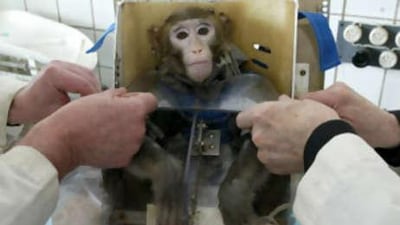The cause of a 50-year-old medical disaster that blighted the lives of thousands worldwide may finally have been identified - with implications that should concern us all. In 1957, the German pharmaceutical company Chemie Grunenthal launched a remedy for the nausea and sleeplessness that often affect pregnant mothers. It went on sale under many names in more than 40 countries, but is best known by a brand name that can still strike a chill in those born in the late 1950s: thalidomide.
By the early 1960s, more than 10,000 babies had been born with severe malformations to mothers who had taken the drug during pregnancy. The tragedy had a dramatic effect on the development of new drugs. Regulatory authorities demanded testing on at least two different animal species before a drug entered human trials - a rule that stands to this day. Yet while this boosted confidence in drug safety, one irony is frequently overlooked. It is far from clear that thalidomide's terrible effects would have been detected even by today's animal testing. Chemie Grunenthal's scientists appeared to have carried out such tests using rats and mice, but whether they extended to studies of pregnant animals remains unclear - not least because key documents mysteriously disappeared.
In the years that followed, other researchers tried to find animals that might have sounded the alarm over thalidomide, but tests on standard lab animals gave inconsistent results. In the end, only two types of monkey and a certain breed of New Zealand rabbit proved capable of producing malformations like those seen in humans - and even then, only at high doses. New research published today appears to get to the root of the problem with thalidomide. A team led by Dr Jurgen Knobloch of the University of Cologne in Germany has shown that the drug generates huge quantities of so-called superoxide - roughly speaking, a toxic form of oxygen molecule, which is able to damage growing cells. The team has also found that mice cells produce much higher levels of glutathione than human cells - a compound which mops up the superoxide, and thus prevents thalidomide from wreaking its damage.
Reporting their findings in the journal Molecular Pharmaceutics, the researchers point out that boosting glutathione to human embryonic cells may help protect them against the drug's effects. While too late to help those whose lives were blighted by the drug during pregnancy, this finding could help rehabilitate thalidomide, which is effective against several serious conditions, including multiple myeloma, a form of cancer.
Yet the real significance of this new research is more basic and far-reaching. It provides further evidence for something which should surprise no one: animals are not humans, and differ in ways that are hard to predict. As such, the new research casts further doubt over the logic of the animal testing that became mandatory after the thalidomide tragedy. Defenders of animal testing have a ready response to those who question the practice. Virtually every medical achievement of the last century, they argue, has depended on the use of animals in some way.
It is a claim widely endorsed by medical researchers. A few years ago, over 500 eminent academics signed a petition supporting the statement, among them three Nobel laureates. And in the case of drug testing, it is undoubtedly true. Every life-saving drug developed over the last few decades has involved the use of animals. But that is because it is mandatory. Crediting animals for their role in such breakthroughs makes no more sense than hailing the wearing of lab coats by the scientists involved. As they always wear them, it is hardly a surprise that lab coats are in evidence when breakthroughs are made. To assess the real value of animals (or lab coats) in drug testing, focusing on success stories alone is not enough. It is crucial to know how and why such tests fail to predict what happens in humans.
That can happen in two ways: firstly, where animals fail to warn of real toxic effects in humans - as in thalidomide - and secondly, where they give false alarms, with the animals falling victim to drugs that would be fine in humans. After decades of drugs trials, it is pretty clear that animals fail in the first way all too often. According to the US Food and Drug Administration, for every 100 pharmaceuticals that successfully pass animal safety testing, 92 fail in human trials.
Gauging the flip side - how often animals wrongly predict harm in drugs that would be safe in humans - is more difficult, not least because such drugs are not allowed to progress to human trials. The truth is, no one has any idea how many wonder drugs are being missed because they failed spurious safety tests involving animals. Even so, any vet can reel off a list of human medicines that will do animals serious harm, from antidepressants and cold cures to cancer treatments and even aspirin.
There is an obvious rejoinder to all this, of course: for all their failings, there is still no reliable alternative to the use of animals. To judge by an international conference held last week at the Royal Society in London, it is an argument fast becoming unsustainable. Organised by the UK-based Safer Medicines Trust, it highlighted progress in a host of techniques which allow drugs to be tested directly on human cells. And in stark contrast to animal testing, a genuine effort is being made to gauge just how reliable such tests are in predicting the effect of the drugs in patients.
It will be some years yet before such techniques become the standard means of assessing new drugs. Until then, we can only hope that the lottery of animal tests does not lead to another medical disaster on the scale of thalidomide. Robert Matthews is Visiting Reader in Science at Aston University, Birmingham, England

